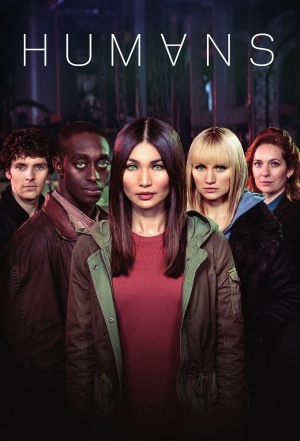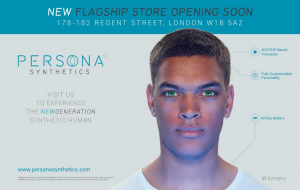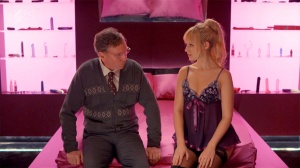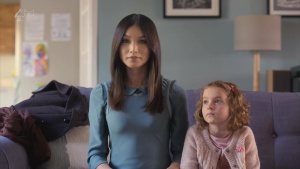Humans (British TV Series)
Humans is a British sci-fi television series produced by Channel 4, Kudos, and AMC. The first season aired on June 14th 2015, with two seasons following, each with eight episodes. Writers, Sam Vincent and Jonathan Brackley are also credited for Broadchurch, The Hour, and The Tunnel. Humans is based on the Swedish science fiction television show Real Humans, which also features consumer humanoid robots. It was also announced in 2018 that a chinese version of Humans was in its early stages [1].
In Humans, the eerily human-like robots are called “Synths”, are available for any consumer that can afford them. They are used for many mundane human tasks such as can taking care of the elderly, cleaning houses, driving cars, babysitting children, and much more. The only thing distinguishing them from humans are their unnatural green eyes. The integration of synths into a reality similar to ours explores the effects of their presence among humans. The main ethical concerns that arise throughout the show revolve around the future of artificial intelligence. In the face of AI, the human race must consider the ethical implications of singularity, robot rights and consciousness, privacy, and human-robot interaction.
Contents
About Humans
Plot Lines
Humans is based in London in a parallel present, aside from the fact that there are synths [2]
- Plot 1 (central): Laura (Katherine Parkinson) and Joe (Tom Goodman-Hill) Hawkins, parents of Mattie, Toby and Sophie, live hectic lives trying to take care of their family. They decide to buy a Synth and name her Anita (Gemma Chan). Anita is not only able to tidy up their house, but also their lives, making everything easier and helping the family to re-connect. However, Anita shows some signs of being slightly off, because of her extensive knowledge of the Hawkins family dynamics.
- Plot 2: George Millican (William Hurt) lives with his Synth Odi (Will Tudor), his government designated caretaker due to health issues. Odi, however, needs to be updated and often malfunctions, but George has formed a father-son bond with him. Because of this, authorities threaten to replace Odi in favor of a stricter, fully functioning Synth. George attempts to hide his relationship with Odi in order to continue living an unhealthy, but free life.
- Plot 3: Leo (Colin Morgan) and his Synth Max (Ivanno Jeremiah) are bound at the hip. Max seems to be unlike other Synths for unknown reasons, and Leo is looking for someone from his past.
- Plot 4: Peter Drummond (Neil Maskell) works on the Special Technologies Task Force combatting any Synth related issues. During the season, he is presented with a case unlike anything he has ever seen.
Themes
The series is known for its exploration into the future of science and technology, covering topics such as robot sentience, artificial intelligence, and human-robot interaction. Throughout, watchers are provoked to think about whether artificial intelligence should have individual rights and independence from humans. The show largely focuses on civil rights and the rebellion of synths, bringing up timely humanitarian and political debates[3].
Awards
Between 2015 and 2016 Humans was nominated for over 15 awards, with 4 total wins. Wins were for Best British TV Drama Writing, Design Titles, Best Drama Series, and Television Craft: Digital Creativity. (Awards)
Marketing
Before Humans announced its TV plot, they duped British consumers into thinking that Synths were available for purchase. [4] Synths were initially listed on a fake eBay store, boasting 200,000 viewers in its first 72 hours. [5] After the initial success, Persona Synthetics was created to pose as the company selling Synths to the public. In collaboration with Microsoft, Persona Synthetics made its debut on Regent Street in London with a faux pop-up shop. The storefront utilized screens with life-size Synths, showing off their varying abilities and advertising what would soon be available in all households. Persona Synthetics took marketing to the next step with a fully-functioning website [6] . The company's slogan is "Bringing you products that are closer to humans than ever."
The initial Synth advertisements generated fear in the UK, with citizens concerned that Synths were actually available [7]. This concern is exactly what the Humans marketing teams aimed for because it caused future viewers to question the reality of just how close this technology may be to actual creation and implementation, causing viewers to become more attentive and interested in the television series.
Synth Creation
All Synths are played by human actors in an attempt to make them seem even more real to viewers. In order to train actors to become Synths, they had to attend Synth School in which they were taught how to cease human body language and gestures. Actress Gemma Chan who plays Anita explains, “It comes down to the fact that Synths are machines, ultimately, and every movement they make uses up energy and battery power so there has to be an economy and a reason everything’s done the way it is.” [8] This removal of human-ness from the Synths is a reminder that Synths do not technically have all human qualities. But in the television series, the Synths prove to have some sort of human-ness programmed inside of them. The inclusion of this "human-ness" inside of the synths as well as their human appearances draws to mind some questions and moral dilemmas as we see them being treated as objects in the show rather than sentient beings. Although they are just robots and are not actually living, the realistic design of them has the effect of making the viewer wonder whether it is morally acceptable to treat or use the synths in the way that they are in the show.
Public Reaction
Humans has been often compared with HBO's popular sci-fi television show Westworld, due to both shows falling under the same genre and level of intensity. Humans has been described as a realistic portrayal of what the world would be like, if the rise of Artificial Intelligence was to lead to the creation of robots that lived amongst us as regular human beings. [9]
The public tends to show interest in futuristic sci-fi media, as books, television shows, and movies with this commonality prove to be very popular. This is because everyone is wary yet also interested in how technology will affect our lives in the future as it continues to become more integrated into our lives. This is why shows like Humans and Westworld likewise movies such as The Matrix and The Terminator and books like The Giver and The Hunger Games are all popular. These works give watchers or readers an idea of what the future of machines could look like, which is absorbed so enthusiastically due to the uncertainty and distrust of artificial intelligence.
Ethical Concerns
The goal of the television show is to bring attention to the simple fact that the successful and complete development of artificial intelligence is not so far away. Their marketing strategies enhanced this message and set the stage for viewers to understand that AI is part of their current lives and will continue to advance. However, AI brings many ethical implications with it. The top four AI ethical concerns presented in the TV show Humans are: singularity, privacy, robot rights, and human-robot interactions [10]
Singularity
Singularity is defined as the hypothesis that artificial intelligence will learn to exponentially upgrade itself in a way that would eventually cause it to surpass the human race. However, humans are currently the most intelligent creatures on Earth. If we, as such intelligent creatures, are working to design artificial intelligence that is more intelligent than us, there is a high likelihood that we are capable of doing so. Frances Grodzinsky has also asked this question, wondering if “an artificial agent that changes its programming [can] become so autonomous that the original designer is no longer” able to control the artificial agent? [11]. Singularity is a heavily debated topic: will it happen or not and when?
Ray Kurzweil, American investor and futurist, hypothesizes that by 2029, artificial intelligence will be able to pass the Turing Test. However, in 2014, it is said that an AI system/chatbot named Eugene Goostman, a simulated 13 year old Ukraine Boy, had passed the Turing Test at Reading University getting 33% of the judges to believe it was a human. [12] By 2045, Kurzweil believes singularity will take place. Others argue that this view is premature [13]
In Humans, Anita shows signs of being more human than her owners expect her to be. The fear that Anita, and other Synths, are more advanced than anticipated causes the television characters and viewers to question if artificial intelligence like this could pose a threat to humanity, and eventually become the superior race. In reality, this is something that everyone, not just the viewers of Humans, needs to consider.
Robot Rights and Consciousness
Warning -- Humans spoiler alert!
There is a scene where viewers are shown a place where Synths act as prostitutes. Niska (Emily Berrington), a Synth, is dedicated to routinely having sex with men and is confined to the orders of those who pay to see her. However, in this particular scene, she gets so fed up with being a prostitute that she violently harms the man ordering her around and breaks out of her brothel prison [14]. This is one of the first instances in which viewers are introduced to the idea that Synths may have the capability of consciousness and awareness. It is later revealed that Synth creator David Elster cracked the code in order to grant Synths consciousness, feeling, and emotion.
In the sex-bot scene of Humans, viewers are lead to feel like Niska is a real person and she deserves to leave her job as a prostitute. But in reality, she is still a robot. Robot rights do not yet exist in the setting of Humans because it is understood by consumers and producers that Synths cannot feel, therefore they do not need rights. The problem here lies in the fact that the characters in Humans did not prepare for robots to achieve some of the same capabilities of humans. If AI in the real world were to advance to something similar to Synths, it would be important to establish robot rights before issues, like consciousness arise. However, when deciding these rights, it is important to fully understand consciousness and why it equates to feelings and emotion. Do humans have a deep enough understanding of consciousness to make decisions regarding the consciousness of other beings?
The European Parliament gathered 150 experts and decided that as of right now, robot rights would not be useful. The reasons for this include that robots currently need a human operator to function. If they were given rights, this would allow operators to deny responsibility for any of the robot's actions. Robot rights might also be cause for granting citizenship to robots, or paying them for work [15].
Floridi opposes this view, suggesting an ecopoetic approach, which is “one which does not privilege the natural or untouched but treats as authentic and genuine all forms of existence and behavior, even those based on artificial, synthetic or engineered artefacts.” [16].
The journey to understanding what it would mean for robots to have rights continues as we propel into the future.
Privacy and Surveillance
Synths are invited into consumers’ homes with little understanding of what information Synths retrieve. In fact, the Hawkins family is often stunned at what information Anita contains, some due to her consciousness and some due to her constant monitoring of the family’s actions. Anita is gathering infinite data on the Hawkins, and they have no idea what information she retains [17] .
If Synths were programmed to be able to surveil their owners, they would be engaging in perfect voyeurism: “covert watching or listening that is neither discovered nor publicized.” [18]. Not knowing how Synth information is stored and who has access to it is a problem that has already manifested itself in current technologies, like Alexa and Apple products. In Humans, there is no mention in the entire show about how Synths might impact someone's privacy. However, perfect voyeurism is debated by many. Some, like Tony Doyle, argue that there is "nothing wrong with perfect voyeurism", but if the voyeurism is "detected or publicized, [it] can do grave harm." [19]. The reason that Doyle argues detection of voyeurism makes it punishable is the fact that if a person knows they are being watched, it could influence their actions and yield unknown consequences. Others, like David Boonin, argue that perfect voyeurism can harm its subjects. His justification for this is that "an act can harm a person by frustrating their desires about how their life goes, that is, even if they are never made aware that their desire has been frustrated." [20] It is important to consider these two opposing arguments when thinking critically about the impact that potential surveillance from Synth's could cause.
In addition to voyeurism, it is important to consider how the impact of that surveillance could affect Synth owners' privacy. Synths like Anita are capable of listening to anything, storing that data, and potentially analyzing it for utilization in the future. If Synth's used the data they gathered on their owners, it could bring up widespread issues of data privacy. Using someone's data, even storing that data, can be considered an obstruction of that person's privacy. Especially if it is unknown what the synths would do with the personal information they have access to on a daily basis - Would they solely use it to learn and expand their own abilities? Would they share this information with other synths and create a larger data base of all human data? Would synths track exactly how their owners behave and use this information against them? According to philosopher and writer Luciano Floridi, the focus for privacy is protecting the information relevant to the user's identity[21]. Not only could synths collect numerous individual pieces of data about their owners, but they could also create patterning from the data collection, revealing aspects of the owners self-identity- a clear breach of privacy[22].
The debate about AI and privacy is difficult to unravel because of the way AI learns. In order for machines to be intelligent, they need massive amounts of data to learn from. If we deny them this data, there is a less likelihood that they can advance and learn quickly enough to show significant progress. In fact, Europe's General Data Protection Regulation (GDPR) attempts to inhibit the ability for AI to capture data, especially without its operators knowing [23]. The key phrase in the GDPR is "without its operators knowing." One must consider: if operators knew that AI was capturing their data, but it was allowing AI to advance, would they allow it? Or, would operators completely deny AI exposure and retainment of their data, stopping the AI learning process in its tracks, and deeming them no longer useful at the expense of the owner who purchased the expensive AI agent.
Human Robot Interaction
As technology has become a more prominent part of current life, it has continued to pose a threat to authentic, technology-free relationships. However, with artificial intelligence, like Synths, which are designed to mimic humans as best as possible, the implications of technology on human relationships become even greater. People will consistently interact with both humans and machines, blurring the lines between the two. Will robots be considered a healthy alternative to human interaction? How does the answer to this question change if robots are able to achieve consciousness?
Andra Kay argues that humans already prefer to interact with robots instead of humans. In an interview, Kay uses the example of OSHbot, a robot designed to work in hardware stores in order to help customers find their product. [24] People sometimes prefer the OSHbot because it does not engage in small talk, but instead, simply finds the product in the store and leads customers to it promptly. When customers are in a rush, this can be preferable to human interaction due to the timely and efficient nature of the OSHbot.
However, others view human-robot interaction as a negative alternative to human interaction. Kelly Hoey explains that human interaction is an important skill to build upon because of the benefits it offers to the economy. She explains that humans need to distinguish themselves from machines because it is human relationships and connections that drive people to buy and sell, not automated robots. [25] Personalization, in her opinion, does not stem from being able to use algorithms to generate product recommendations for a customer. Instead, personalization is the power of humans to connect with one another.
The question of the impact of human to robot interactions if robots achieve consciousness still remains because currently, there are no experts in the area. However, Humans offers a glimpse into how these interactions might take place and their ripple effect.
See Also
- Amazon Alexa
- Artificial Intelligence and Technology
- Artificial SuperIntelligence
- Black Mirror
- Confidentiality of Online Data
- Informational Friction
- Surveillance Technologies
- Technological Singularity
- Virtual Assistants
- Westworld and AI
- Robot slaves
Sources
- ↑ Peter White [1], "AMC & C4 Sci-Fi Drama ‘Humans’ To Be Remade In China Via Endemol Shine & Croton Media", "Deadline", July 25, 2018
- ↑ Trevor Kimball [2], "Humans: New AMC TV Show to Debut", "TV Series Finale" 2015.
- ↑ Chavez, Danette. [3], "Why Aren't You Watching Humans?", "AV Club", 2018.
- ↑ [4], "Channel 4 dupes viewers into thinking robot servants for sale", "ITV News" 2015.
- ↑ Ryan Love [5], "Channel 4 explains innovative Humans marketing campaign", "Digital Spy" 2015.
- ↑ [6], "Persona Synthetics"
- ↑ [7], "Channel 4 dupes viewers into thinking robot servants for sale", "ITV News" 2015.
- ↑ Louisa Mellor [8], "Humans: Channel 4 and AMC's sci-fi drama releases its first image", "Digital Spy" 2015.
- ↑ Jen Chaney, "Humans Is The Best Robot Show on TV" https://www.vulture.com/2017/02/amc-humans-better-than-westworld.html
- ↑ Julia Bossmann, [ https://www.weforum.org/agenda/2016/10/top-10-ethical-issues-in-artificial-intelligence "Top 9 Ethical Issues in Artificial Intelligence"], World Economic Forum, 2016. Retrieved 2019-03-15.
- ↑ Frances Grodzinsky, "The Ethics of Designing Artificial Agents", Sacred Heart University, 2008. Retrieved 2019-03-15.
- ↑ “Computer AI Passes Turing Test in 'World First'.” BBC News, BBC, 9 June 2014, www.bbc.com/news/technology-27762088.
- ↑ Luke Dormhel, "A beginner’s guide to A.I. superintelligence and ‘the singularity’", Digital Trends, 2017. Retrieved 2019-03-27.
- ↑ Erin Donnelly, "I, Sexy Robot: Will Humans Put A New Spin On Female AI?", Refinery 29, 2015. Retrieved 2019-03-18.
- ↑ Dana Dovey, "HUMANS VS ROBOTS: DON’T GIVE ADVANCED MACHINES RIGHTS, AI EXPERTS WARN", Newsweek, 2018. Retrieved 2019-03-18.
- ↑ Luciano Floridi, "The Fourth Revolution", Oxford University Press, 2014. Retrieved 2019-03-15.
- ↑ Paula Mejia, "IN AN ANDROID WORLD, ‘HUMANS’ IS REAL AND TERRIFYING", "Newsweek", 2015. Retrieved 2019-03-15.
- ↑ Tony Doyle, "Privacy and perfect voyeurism", "Springer", 2009. Retrieved 2019-03-15.
- ↑ Tony Doyle, "Privacy and perfect voyeurism", "Springer", 2009. Retrieved 2019-03-15.
- ↑ David Boonin, "What's Wrong With Voyeurism?", "What's Wrong?", 2017. Retrieved 2019-03-24.
- ↑ Floridi, Luciano. Four challenges for a theory of informational privacy, Ethics and Information Technology, 2006, 109–119.
- ↑ Shoemaker, David. Self-exposure and exposure of the self: informational privacy and the presentation of identity, 2009.
- ↑ David Meyer, "AI Has a Big Privacy Problem and Europe's New Data Protection Law Is About to Expose It", "Fortune", 2018. Retrieved 2019-03-18.
- ↑ Stuart Dredge, [https://www.theguardian.com/technology/2015/nov/03/life-with-robots-silicon-valley-robotics-social-interaction " Life with robots: 'What people enjoy most is avoiding social interaction'"], The Guardian, 2015. Retrieved 2019-03-14.
- ↑ Shelly Madden, [https://www.siliconrepublic.com/advice/kelly-hoey-communication-inspirefest-2017 " In a world of robots, human connection is more important than ever'"], Silicon Republic, 2017. Retrieved 2019-03-24.



